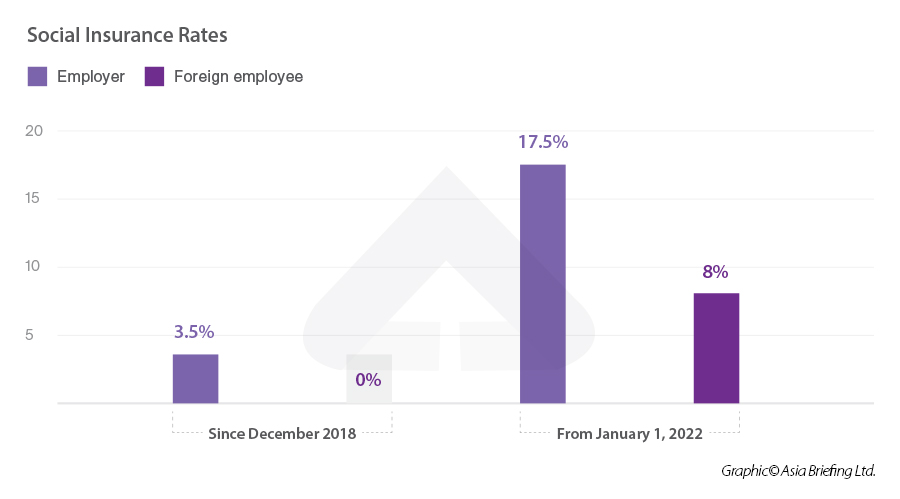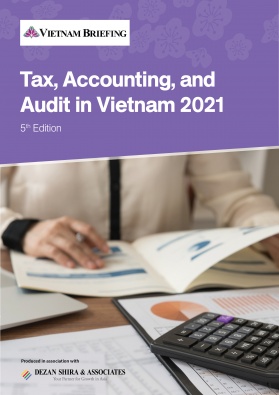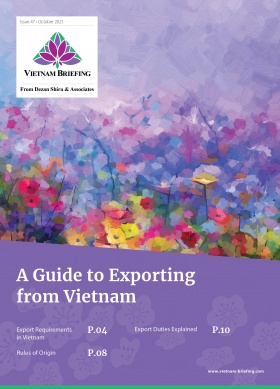Foreign Employees Subject to Increased Social Insurance Rates from January 2022
Foreign workers in Vietnam will be subject to increased social insurance (SI) rates from January 1, 2022. As discussed earlier, foreign employees will have to pay an 8 percent social insurance rate, while employers will have to contribute 17.5 percent to the social insurance fund. Thus, this will be in line with the same rates as Vietnamese employees.
Similar to Vietnamese employees, the mandatory SI scheme for foreign employees covers sickness, maternity, occupational diseases, and accidents, retirement, and death.
The salary subject to social insurance contribution is what is defined as per the labor contract, but this is capped at 20 times the minimum salary for social insurance contributions set by the government.
At present, the maximum salary cap for the social insurance contribution is US$1,295 (VND 29 million).
Social insurance was made mandatory for all working foreigners as of December 1, 2018, under Decree 143/2019/ND-CP.
Criteria for social insurance contribution of foreign workers in Vietnam
As per the Ministry of Labour, Invalids and Social Affairs (MoLISA), foreign workers are subject to mandatory social insurance when they meet all the following conditions:
- Working in Vietnam with a work permit;
- Employed under a Vietnamese labor contract with an indefinite or definite term of one year or more;
- Below 60 years of age for men or 55 years of age for women; (Please note that the retirement age is being gradually increased as per the new labor code to 62 for men and 60 for women by 2028 and 2035 respectively); and
- Are not an intra-company transferee (must be a manager/executive/expert/technician employed by the overseas entity for at least 12 months before being assigned to the company’s operations in Vietnam).
Once a foreign worker’s employment in Vietnam expires, the foreign worker can claim a one-off payment on the contributed amount from the social insurance agency in the following circumstances:
- Reach retirement age, but have not contributed social insurance for the full 20 years;
- Suffer from a fatal disease such as cancer, polio, HIV, or other diseases regulated by the Ministry of Health;
- Satisfied conditions for pension, but are not living in Vietnam anymore; and
- Their employment contract is terminated or their work permit expires without renewal.
Foreign employees should make the allowance request within 30 days before their contract or work permit expires. The insurance authority is required to settle and pay the allowance to the employee within 10 days from the date of receipt.
Plan ahead for January 2022
Businesses and foreign employees should prepare for the new year when the new social insurance rates take effect. While the SI rates will equal the divide between local and foreign employees, many business leaders have said that this would increase their costs for foreign workers.
For businesses, high payment into social insurance will also mean less money for daily expenses. While some of this may be offset due to tax incentives related to the pandemic, businesses will have to factor in additional compliance costs as firms reorient their labor policies to accommodate the new policy.
About Us
Vietnam Briefing is produced by Dezan Shira & Associates. The firm assists foreign investors throughout Asia from offices across the world, including in Hanoi, Ho Chi Minh City, and Da Nang. Readers may write to vietnam@dezshira.com for more support on doing business in Vietnam.
We also maintain offices or have alliance partners assisting foreign investors in Indonesia, India, Singapore, The Philippines, Malaysia, Thailand, Italy, Germany, and the United States, in addition to practices in Bangladesh and Russia.
- Previous Article 为什么你应该投资越南的电子商务行业
- Next Article Transfer Pricing in Vietnam – An Overview































